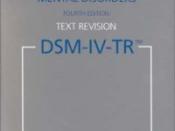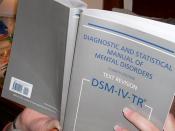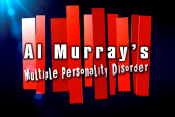The classification of personality disorders is controversial. An example would be that the DSM-IV has disorders listed that have discrepancies with the book used in Europe, the ICD-10. Narcissism is included in the DSM-IV, but not the ICD-10. Another example is that a person's culture plays a large role in diagnosis. In Africa, it might be considered a great thing to have a spirit of a dead relative speak with you on a regular basis. Here in North America, one would be institutionalized for admitting to such a phenomena. Our local newspaper, the ST. Catharines Standard, had an article on Saturday (Feb. 21/04) entitled, "Why marrying dead people is a very bad idea", written by a columnist named William Thomas. It seems that in France, marrying the deceased is not a crime or considered the least bit odd; it happens regularly enough. The lady told French television that she had married her fiancée who had been dead for 17 months because "her feelings for him had not dimmed."
Now, I am not a law or Psychology expert, but I think that this would fit into a personality disorder on many levels as well as a mental disorder here in North America.
Another problem is that while Psychologists can agree that a personality disorder is present, but they may disagree on the specific type or criteria. For example, Cleckley used the term psychopathy to describe Antisocial Personality, which emphasized emotional deficits and personality traits, and Lee wrote a book that influenced the concept of ASPD in 1966 that placed emphasis on observable behaviors and repeated conflict with authority. Cleckley's definition was found to have problems with reliability because of the elusive features he used, such as 'incapacity for love'. Lee's book showed reliable predictors of antisocial behavior when children with...


